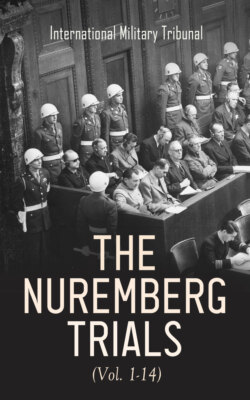Читать книгу The Nuremberg Trials (Vol. 1-14) - International Military Tribunal - Страница 251
На сайте Литреса книга снята с продажи.
Оглавление“F: ‘How do you do, doctor? My brother-in-law, is he with you?’
“Seyss-Inquart: ‘No.’ ”
Thereupon the conversation took approximately the following turn:
“Göring: ‘How are things with you? Have you resigned or do you have any news?’
“Seyss-Inquart: ‘The Chancellor has cancelled the elections for Sunday, and therefore he has put S’ ”—Seyss-Inquart—“ ‘and the other gentlemen in a difficult situation. Besides having called off the elections, extensive precautionary measures are being ordered; among others, curfew at 8 p.m.’
“Göring replied that in his opinion the measures taken by Chancellor Schuschnigg were not satisfactory in any respect. At this moment he could not commit himself officially. Göring will take a clear stand very shortly. In calling off the elections he could see a postponement only, not a change of the present situation which had been brought about by the behavior of the Chancellor Schuschnigg in breaking the Berchtesgaden agreement.
“Thereafter a conversation took place between Göring and the Führer. Afterwards Göring again telephoned Seyss-Inquart. This conversation was held at 15:05.
“Göring told Seyss-Inquart that Berlin did not agree whatsoever with the decision made by Chancellor Schuschnigg since he did not enjoy any more the confidence of our Government because he had broken the Berchtesgaden Agreement, and therefore further confidence in his future actions did not exist. Consequently the national Ministers, Seyss-Inquart, and the others are being requested immediately to hand in their resignations to the Chancellor, and also to ask the Chancellor to resign. Göring added that if after a period of 1 hour no report had come through, the assumption would be made that Seyss-Inquart would no more be in a position to telephone. That would mean that the gentlemen had handed in their resignations. Seyss-Inquart was then told to send the telegram to the Führer as agreed upon. As a matter of course, an immediate commission by the Federal President for Seyss-Inquart to form a new cabinet would follow Schuschnigg’s resignation.”
Thus you see that at 2:45 p.m. Göring told Seyss-Inquart over the telephone that it was not enough for Schuschnigg to cancel the elections; and 20 minutes later he telephoned Seyss-Inquart to state that Schuschnigg must resign. That is your second ultimatum. When informed about an hour later that Schuschnigg had resigned he pointed out that in addition it was necessary to have Seyss-Inquart at the head of the Cabinet. Shall I go into another one of these?
THE PRESIDENT: I think we had better adjourn now until 2 o’clock.
[The Tribunal recessed until 1400 hours.]
